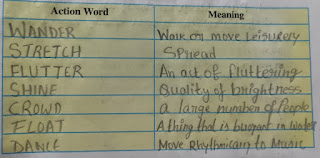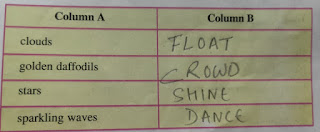THE DAFFODILS BY WILLIAM WORDSWORTH| THE DAFFODILS CLASS 7 QUESTIONS AND ANSWERS
 |
| Lesson 7: The daffodils |
Sunbeam English Reader Class 7 Chapter 5 The Daffodils all questions answers
1. Did you understand the theme of the poem?
Discuss with your teacher the following questions orally. Then, write the answers in your exercise book.
(a) Read the first Stanza. : Then find the answers to the following question: With what does the poet William Wordsworth compare himself?
Answer: The poet of this poem “The Daffodils” is William Wordsworth. He Compares himself to a piece of lonely cloud.
(b) Read the second stanza. Now find out the following: With what does Wordsworth compare the daffodils?
Answer: The poet of this poem in the second stanza of this poem “The Daffodils” Compares the daffodils to stars in the sky.
(c) Read and recite the third stanza. Now find out what Wordsworth means by 'jocund' company from the options below :
(i) happy and cheerful
(ii) talkative
(iii) quiet and sad
Answer: Happy and Cheerful.
(d) Read and recite the lines :
“I gazed-and gazed-but little thought
What wealth the show to me had brought.”
What does the poet mean by the word ‘Wealth’? Why does he use the word here?
Answer: Here in this stanza by the word “Wealth” the poet means the happiness which the mere sight of golden daffodils had brought to the poet.
The poet use this word “Wealth” because he felt that the peace, happiness and the pleasant memory which he enjoyed for a long time is worth more than wealth.
(e)Read the last stanza of the poem and find out the following information:
What happens to the poet when he lies on his couch in a sad and thoughtful mood?
Answer: Whenenver the poet lies on his bed in a sad and thoughtful mood, the joyful sight of the daffodils flash upon his eyes because the joyful sight of the daffodils become an never unforgettable memory for the poet.
2. Choose the correct options in each of the following questions:
(a) The poet compares himself to
(i) a piece of lonely cloud
(ii) a host of golden daffodils
(iii) a lake
(iv) The trees
Answer : (i) A piece of lonely cloud
(b) While wandering alone, the poet saw
(i) a crowd of people
(ii) clouds floating over vales and hills
(iii) a host of golden daffodils
(iv) a lake
Answer: a host of golden daffodils
(c) The poet compares the daffodils to
(i) a lonely cloud
(ii) a lake
(iii) the stars in a milky way
(iv) a bay
Answer: (iii) the stars in a milky way.
(d) The 'jocund company' referred to is the company of
(i) the daffodils
(ii) the sparkling waves of the lake
(iii) the dancing daffodils and the waves of the lake
(iv) the stars on the milky way
Answer: (iii) the dancing daffodils and the waves of the lake.
(e) The inward eye of the poet is the poet's
(i) vacant mood
(ii) thoughtful mood
(iii) imagination
(iv) bliss of solitude
Answer : (ii) Imagination
3. Read the poem and match the following:
4.Read the poem again and answers the following questions:
(a) Find a word in stanza 1 that means 'to roam about'
Answer: Wander'd
(b) Find out what 'o'er' means. How will you write the actual word?
Answer: 'O'er' means 'over'.
(c) Find a word in stanza 2 which means 'a lake'.
Answer: 'Bay' means a lake
(d) What does the poet refer to when he says, 'Ten thousand saw I'?
Answer: The poet refers to 'Star'
(e) What is 'sprightly dance'?
Answer: It means full of spirit and vitality.
(f) Give another word each for 'glee' and 'jocund'.
Answer:
Glee - frolic
'jocund' - delightful.
(g) What is out-did in 'out-did the sparkling waves'?
Answer: Out-did: Here the word out-did is used to express the beauty and joy which the sparkling waves gaves to the poet is incomparable to daffodils since the sparkling waves donot bring much joy.
(h) Give the opposite of the following words: vacant, pleasure, bliss
Answer:
Vacant - Full,
Pleasure - Pain,
Bliss - Joy.
5. A beautiful poem is meant to be recited. Listen to the teacher reading to you the following pairs of words from the poem. Then repeat the words after the teacher and practice the pronunciation of each word. This will help you recite the poem.
(a) Wandered - Wondered
(b) Breeze - bridge
(c) Shine - sign
(d) Strerched - stressed
(e) They - day
(f) Show - sow
(g) flash - flesh
(h) heart - hurt
6. Let us go back to the poem once more and note the following :
(a) The first line (L1) of the poem ends with cloud.
(b) L 2 ends with Hills.
(c) L 3 ends with the crowd .
(d) L 4 ends with daffodils.
Note that the cloud and crowd are a pair of rhyming words.
Also, note that hills and daffodils are a pair of rhyming words.
Now, make a list of the other rhyming words in the poem.
Choose from the box the word rhyming with the underlined word and complete the sentence :
(i) Still (ii) dancing (iii) mood (iv) breeze
(a) The sun is shining and the girl is dancing.
(b) The forest is full of green trees and the flowers are dancing in the cool breeze.
(c) On the top of the bare hill, I stand mute and still.
(d) Don't spoil my mood by being so rude.
7. (a)Rewrite the following poetic lines in everyday English.
(i) Ten thousand saw I at a glance
Answer: I saw many stars at a glance.
(ii) For oft when on my couch I lie in vacant or in a pensive mood.
Answer: When I lie on my bed doing nothing in thoughtful mood.
(iii) Then my heart with pleasure fills.
Answer: Then my heart us filled with pleasure
(b) Find two words in the poem that are poetic in form and are not used in prose. Write a sentence illustrating the use of each of the two words.
(c) Illustrate the differences in meaning between gaze and stare by writing a sentence using each.
Gaze: That Thief shifted his gaze from the police
Stare: The rag pickers continued to stare at municipality van.
8. Note that one word in each of the following lines is wrong. Rewrite the extract below by replacing the wrong word with the correct word of the poem.
Wrong Extract
The trees beside them danced, but they
out-did the twinkling waves in glee:
A cloud could not but be gay
In such a joyous company!
I gazed-and gazed-but also thought
What wealth the sight to me had brought.
Corrected Extract
The waves beside them danced, but they
out-did the sparkling waves in glee:
A poet could not but be gay
In such a jocund company!
I gazed-and gazed-but little thought
What wealth the show to me had brought.
9. Your teacher will divide you into four or eight groups. Each group will work on the stanza given to you. In your group, discuss the stanza given to you and write the main idea of the stanza in two or more sentences. Then collect all the passages and paste them on a chart paper along with the poem, and hang the chart in the class.
10. Let's learn some grammar :
Here are some lines that tell us what the poet said he was doing in the poem. Working with your partner, fill in the blank spaces with the correct form of the word.
11. Read the poem carefully. Pick out the words from each stanza that indicate or refer to some kind of action or work. In your exercise book, make a list of all the action words that you have picked out. Use the dictionary to find out the meaning of unfamiliar action words.
You can list the words and their meanings in a table as shown below.
12.(a) The action words that you have listed refer to some kind of action or work done by the poet. Such words are called verbs. Write down some action words in column B that match with the nouns in Column A.
(b) Working with your partner, use the verbs in Column B and write sour sentences that tell what the nouns in Column A were doing.
One has been done for you.
(i) The cloud was floating over vales and hills.
(ii) When all at once I saw a crowd of golden daffodils.
(iii) Daffodils were shining like the stars.
(iv) The sparkling waves were dancing beneath the trees.
13. You have come across the term preposition. You know that prepositions are words like at, as, by, for, to, etc. These words are usually placed before a noun or a pronoun to show their relation to place, time, direction, means, etc.
Look at these phrases from the poem:
(i) Over vales and hills
(ii) beside the lake
(iii) beneath the trees
the underlined words are prepositions denoting a place.
Here are some more examples:
(i) in the morning
(ii) at noon
(iii) on Monday
The underlined words above are prepositions denoting time.
Now read these phrases :
(i) up the hill
(ii) down the road
(iii) to the north
The underlined words in these three examples are prepositions denoting direction.
Here are some more phrases :
(i) by car
(ii) on foot
(iii) with a knife
Hereby, on, with, denote how something is done. For example,
I cut the apple with a knife.
Now complete these sentences with the correct prepositions.
(i) Clouds float over hills and valleys. (on/over/by)
(ii) The daffodils bloomed beside a lake. (beneath/beside/between)
(iii) Stars were shining in the night sky. (on/in/over)
(iv) They formed a line along the shore of a bay. (beneath/along/for)
(v) He would often lie on his couch lost in thoughts. (on/in/by)
14. Discuss in groups and write a few lines on:
(a) How you felt after you saw a beautiful garden full of bloomings flowers.
(b) a place without trees and flowers.
15. (a) Let’s play a game:
Sit in a circle. Your teacher will tell you a story. After a few sentences she/he will stop narrating. Each student will continue to narrate the story from the point where the previous one has stopped. Each student is supposed to add four to ten sentences. You may add new characters, events, descriptions and so on. The one who comes up with the maximum number of sentences will be the winner.
(b) Now write the story in your own words. Give a suitable title.
Discuss with your teacher the following questions orally. Then, write the answers in your exercise book.
(a) Read the first Stanza. : Then find the answers to the following question: With what does the poet William Wordsworth compare himself?
Answer: The poet of this poem “The Daffodils” is William Wordsworth. He Compares himself to a piece of lonely cloud.
(b) Read the second stanza. Now find out the following: With what does Wordsworth compare the daffodils?
Answer: The poet of this poem in the second stanza of this poem “The Daffodils” Compares the daffodils to stars in the sky.
(c) Read and recite the third stanza. Now find out what Wordsworth means by 'jocund' company from the options below :
(i) happy and cheerful
(ii) talkative
(iii) quiet and sad
Answer: Happy and Cheerful.
(d) Read and recite the lines :
“I gazed-and gazed-but little thought
What wealth the show to me had brought.”
What does the poet mean by the word ‘Wealth’? Why does he use the word here?
Answer: Here in this stanza by the word “Wealth” the poet means the happiness which the mere sight of golden daffodils had brought to the poet.
The poet use this word “Wealth” because he felt that the peace, happiness and the pleasant memory which he enjoyed for a long time is worth more than wealth.
(e)Read the last stanza of the poem and find out the following information:
What happens to the poet when he lies on his couch in a sad and thoughtful mood?
Answer: Whenenver the poet lies on his bed in a sad and thoughtful mood, the joyful sight of the daffodils flash upon his eyes because the joyful sight of the daffodils become an never unforgettable memory for the poet.
2. Choose the correct options in each of the following questions:
(a) The poet compares himself to
(i) a piece of lonely cloud
(ii) a host of golden daffodils
(iii) a lake
(iv) The trees
Answer : (i) A piece of lonely cloud
(b) While wandering alone, the poet saw
(i) a crowd of people
(ii) clouds floating over vales and hills
(iii) a host of golden daffodils
(iv) a lake
Answer: a host of golden daffodils
(c) The poet compares the daffodils to
(i) a lonely cloud
(ii) a lake
(iii) the stars in a milky way
(iv) a bay
Answer: (iii) the stars in a milky way.
(d) The 'jocund company' referred to is the company of
(i) the daffodils
(ii) the sparkling waves of the lake
(iii) the dancing daffodils and the waves of the lake
(iv) the stars on the milky way
Answer: (iii) the dancing daffodils and the waves of the lake.
(e) The inward eye of the poet is the poet's
(i) vacant mood
(ii) thoughtful mood
(iii) imagination
(iv) bliss of solitude
Answer : (ii) Imagination
3. Read the poem and match the following:
4.Read the poem again and answers the following questions:
(a) Find a word in stanza 1 that means 'to roam about'
Answer: Wander'd
(b) Find out what 'o'er' means. How will you write the actual word?
Answer: 'O'er' means 'over'.
(c) Find a word in stanza 2 which means 'a lake'.
Answer: 'Bay' means a lake
(d) What does the poet refer to when he says, 'Ten thousand saw I'?
Answer: The poet refers to 'Star'
(e) What is 'sprightly dance'?
Answer: It means full of spirit and vitality.
(f) Give another word each for 'glee' and 'jocund'.
Answer:
Glee - frolic
'jocund' - delightful.
(g) What is out-did in 'out-did the sparkling waves'?
Answer: Out-did: Here the word out-did is used to express the beauty and joy which the sparkling waves gaves to the poet is incomparable to daffodils since the sparkling waves donot bring much joy.
(h) Give the opposite of the following words: vacant, pleasure, bliss
Answer:
Vacant - Full,
Pleasure - Pain,
Bliss - Joy.
5. A beautiful poem is meant to be recited. Listen to the teacher reading to you the following pairs of words from the poem. Then repeat the words after the teacher and practice the pronunciation of each word. This will help you recite the poem.
(a) Wandered - Wondered
(b) Breeze - bridge
(c) Shine - sign
(d) Strerched - stressed
(e) They - day
(f) Show - sow
(g) flash - flesh
(h) heart - hurt
6. Let us go back to the poem once more and note the following :
(a) The first line (L1) of the poem ends with cloud.
(b) L 2 ends with Hills.
(c) L 3 ends with the crowd .
(d) L 4 ends with daffodils.
Note that the cloud and crowd are a pair of rhyming words.
Also, note that hills and daffodils are a pair of rhyming words.
Now, make a list of the other rhyming words in the poem.
Choose from the box the word rhyming with the underlined word and complete the sentence :
(i) Still (ii) dancing (iii) mood (iv) breeze
(a) The sun is shining and the girl is dancing.
(b) The forest is full of green trees and the flowers are dancing in the cool breeze.
(c) On the top of the bare hill, I stand mute and still.
(d) Don't spoil my mood by being so rude.
7. (a)Rewrite the following poetic lines in everyday English.
(i) Ten thousand saw I at a glance
Answer: I saw many stars at a glance.
(ii) For oft when on my couch I lie in vacant or in a pensive mood.
Answer: When I lie on my bed doing nothing in thoughtful mood.
(iii) Then my heart with pleasure fills.
Answer: Then my heart us filled with pleasure
(b) Find two words in the poem that are poetic in form and are not used in prose. Write a sentence illustrating the use of each of the two words.
(c) Illustrate the differences in meaning between gaze and stare by writing a sentence using each.
Gaze: That Thief shifted his gaze from the police
Stare: The rag pickers continued to stare at municipality van.
8. Note that one word in each of the following lines is wrong. Rewrite the extract below by replacing the wrong word with the correct word of the poem.
Wrong Extract
The trees beside them danced, but they
out-did the twinkling waves in glee:
A cloud could not but be gay
In such a joyous company!
I gazed-and gazed-but also thought
What wealth the sight to me had brought.
Corrected Extract
The waves beside them danced, but they
out-did the sparkling waves in glee:
A poet could not but be gay
In such a jocund company!
I gazed-and gazed-but little thought
What wealth the show to me had brought.
9. Your teacher will divide you into four or eight groups. Each group will work on the stanza given to you. In your group, discuss the stanza given to you and write the main idea of the stanza in two or more sentences. Then collect all the passages and paste them on a chart paper along with the poem, and hang the chart in the class.
10. Let's learn some grammar :
Here are some lines that tell us what the poet said he was doing in the poem. Working with your partner, fill in the blank spaces with the correct form of the word.
 |
| Daffodils |
11. Read the poem carefully. Pick out the words from each stanza that indicate or refer to some kind of action or work. In your exercise book, make a list of all the action words that you have picked out. Use the dictionary to find out the meaning of unfamiliar action words.
You can list the words and their meanings in a table as shown below.
12.(a) The action words that you have listed refer to some kind of action or work done by the poet. Such words are called verbs. Write down some action words in column B that match with the nouns in Column A.
(b) Working with your partner, use the verbs in Column B and write sour sentences that tell what the nouns in Column A were doing.
One has been done for you.
(i) The cloud was floating over vales and hills.
(ii) When all at once I saw a crowd of golden daffodils.
(iii) Daffodils were shining like the stars.
(iv) The sparkling waves were dancing beneath the trees.
13. You have come across the term preposition. You know that prepositions are words like at, as, by, for, to, etc. These words are usually placed before a noun or a pronoun to show their relation to place, time, direction, means, etc.
Look at these phrases from the poem:
(i) Over vales and hills
(ii) beside the lake
(iii) beneath the trees
the underlined words are prepositions denoting a place.
Here are some more examples:
(i) in the morning
(ii) at noon
(iii) on Monday
The underlined words above are prepositions denoting time.
Now read these phrases :
(i) up the hill
(ii) down the road
(iii) to the north
The underlined words in these three examples are prepositions denoting direction.
Here are some more phrases :
(i) by car
(ii) on foot
(iii) with a knife
Hereby, on, with, denote how something is done. For example,
I cut the apple with a knife.
Now complete these sentences with the correct prepositions.
(i) Clouds float over hills and valleys. (on/over/by)
(ii) The daffodils bloomed beside a lake. (beneath/beside/between)
(iii) Stars were shining in the night sky. (on/in/over)
(iv) They formed a line along the shore of a bay. (beneath/along/for)
(v) He would often lie on his couch lost in thoughts. (on/in/by)
14. Discuss in groups and write a few lines on:
(a) How you felt after you saw a beautiful garden full of bloomings flowers.
(b) a place without trees and flowers.
15. (a) Let’s play a game:
Sit in a circle. Your teacher will tell you a story. After a few sentences she/he will stop narrating. Each student will continue to narrate the story from the point where the previous one has stopped. Each student is supposed to add four to ten sentences. You may add new characters, events, descriptions and so on. The one who comes up with the maximum number of sentences will be the winner.
(b) Now write the story in your own words. Give a suitable title.

.png)







No comments:
Post a Comment